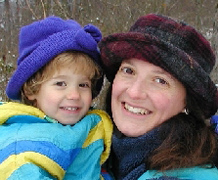Northwest Research Associates
| |
 |
I was born and raised outside Boston, Massachusetts, went to college in Connecticut, graduate school in Hawaii, so I've been lucky to live in some very nice places. I work in Boulder, Colorado (see "nice places" statement!)
Boston is a great place for someone with scientific interests, and I took advantage of many, from classes for children at the Boston Museum of Science to workshops and opportunities at planetariums and public telescopes.
My earliest memory about the Sun is watching a solar eclipse from the beach on Cape Cod when I was about 3.
I was always curious about everything, and had a mother who really fostered that. I remember watching the night sky in February in western Massachusetts and deciding then that I wanted to be an astronomer. I think I was 8 years old.
I was educated at a large public high school outside of Boston, Yale University, and University of Hawai'i and now hold B.S., M.S., and Ph.D. degrees.
Although I wasn't planning on being a solar physicist - I did stellar astronomy until graduate school, but was funded to do solar research, and I got hooked on polarimetry (study of the polarized light from the sun). I always liked spectra, and to some extent I simply am a stellar spectroscopist who happens to study the sun.
I study the magnetic fields in sunspots, specifically how sunspots form, why some of them produce solar flares, and what the detailed structure is of sunspots. In a typical week I will try and read one or two scientific papers, I will write a lot of computer code, and depending on the time of year, will work on proposals for funding or write papers to be published. I am often at the observatory taking data, which is very hard but a lot of fun. Occasionally I will go to meetings to talk with other scientists.
What keeps me interested in being a solar physicist is curiosity. I do like other topics, including stellar physics, and environmental studies. I routinely use computers, and use the World Wide Web daily to gauge the state of the sun and data that I am likely to use. I communicate with colleagues from around the world over email. When I am collecting data, I make use of large telescopes, dozens of computers and associated technology, and I often use data from spacecraft either orbiting the Earth or the Earth-Sun L-1 point.
I like being a scientist: I like when the answers to the question we are investigating come together, like pieces of a jigsaw puzzle. Because you can't go to the sun and measure things directly like with a thermometer, you have to think of clever ways of measuring the state of the solar atmosphere. It is wonderful when the data from those clever ways all give you part of a consistent, physical picture that you can understand. It is also, of course, wonderful when a new puzzle is discovered! I also like that we get to travel quite extensively, to meetings and to different observing facilities, and to work with other scientists in different countries. This gives you a wonderful perspective on the world, which more than makes up for the fact that most scientists make good, but by no means enormous, salaries.
One of my dislikes as a scientist is the fact that society does not truly seem to appreciate pure science (read: fund pure science at a substantial and _constant_ or at least not politically-fluctuating level). The emphasis is too often on "what can science to for humans" as opposed to "let's find out simply what is going on here!".
There are quite a few women in solar physics now, which makes for a great camaraderie. I think there is still a bit of 'tokenism', since the field is still dominated by men, but I feel that is changing quite rapidly. The specialty in which I work is quite sparsely populated period, so it is quite a nice feeling to be in a room of older men all of whom are looking to me for input on a question within my expertise!
In addition to science, I enjoy in-line skating, native habitat restoration, back-packing, gardening, and skiing.
If you are thinking of pursuing a career in science my advice would be: Go for it! I think an overwhelming sense of curiosity is more important than straight-A's, and flexibility and creativity is more important than having taken every last physics and math course possible (of course a good basis is essential, but minor gaps in one's education can be dealt with when necessary, provided you have the curiosity and courage to do so!).